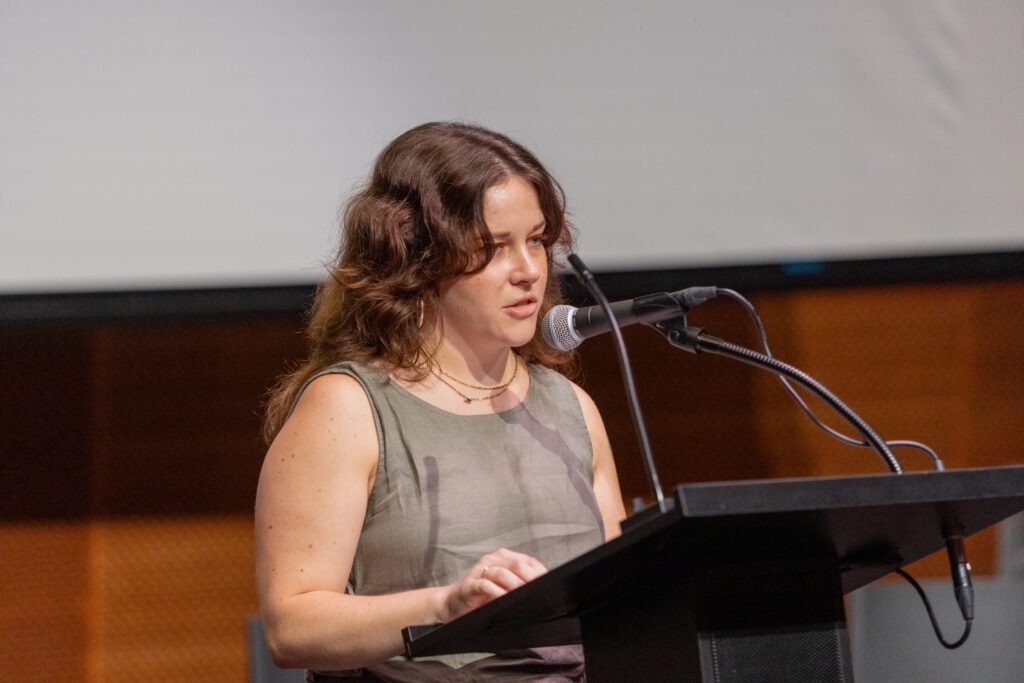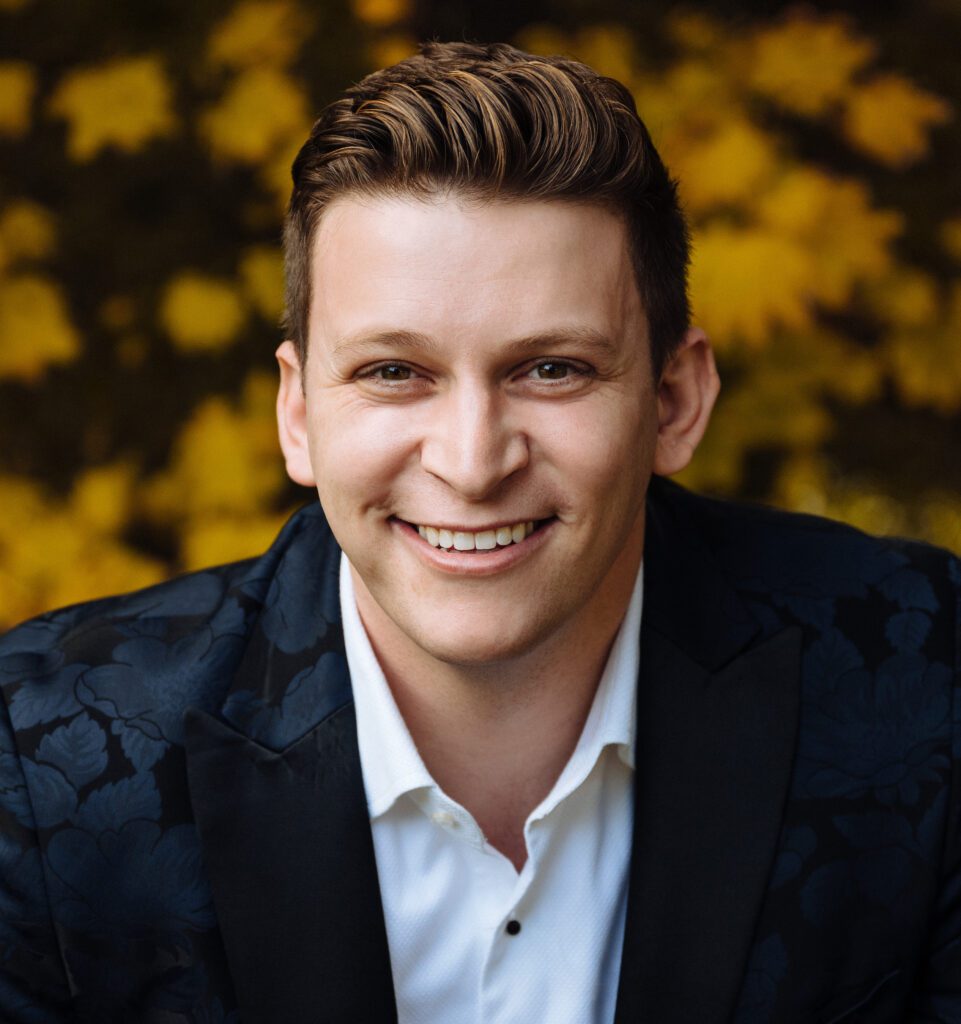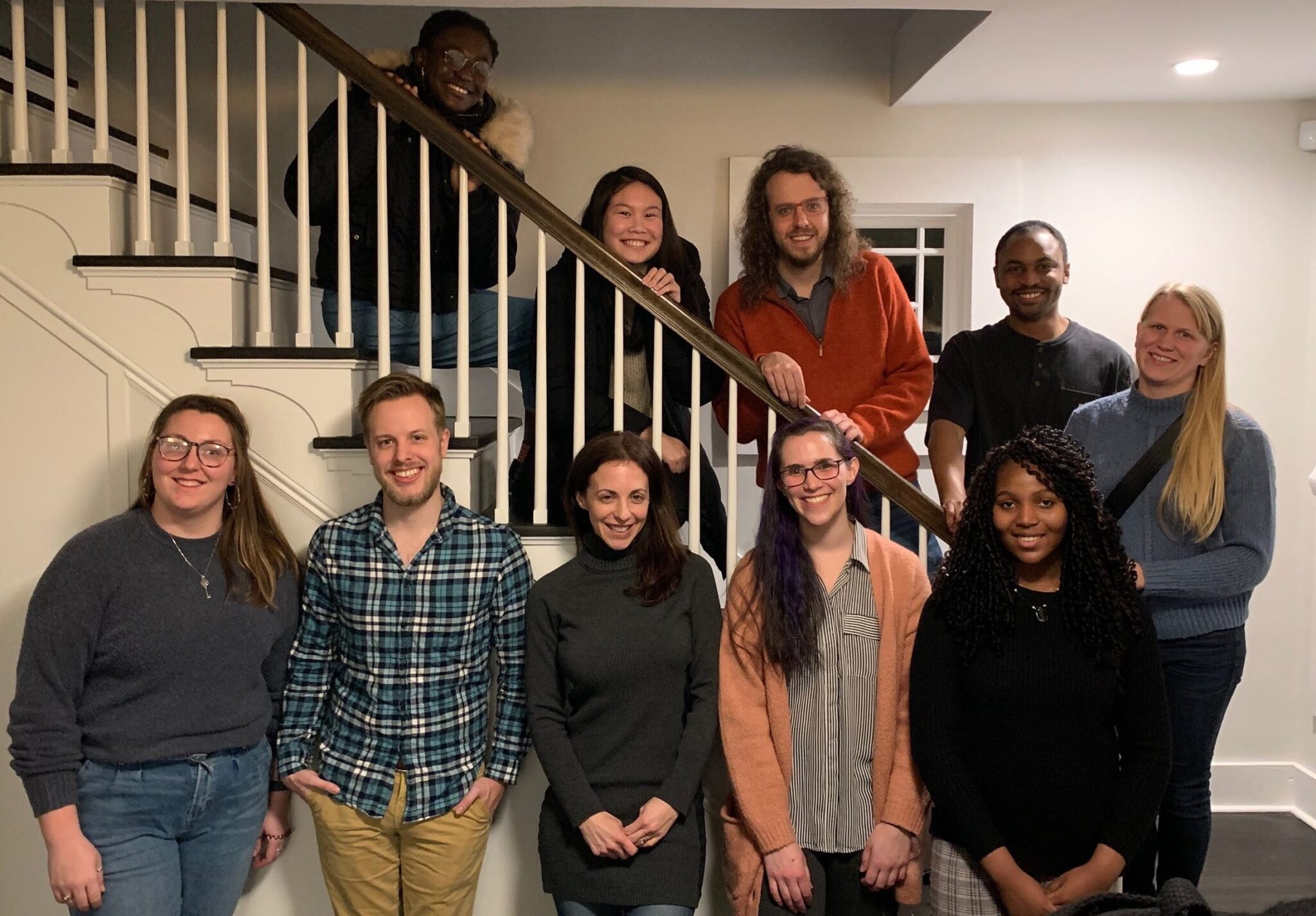The Department of Music was pleased to welcome Dr. Elizabeth Margulis to the faculty in the Fall of 2019 as Professor of Music and Director of Graduate Studies (Musicology) to examine the relationship between music and the mind. Since her appointment, Dr. Margulis has built a robust infrastructure through which to marry the fields of cognitive science and music. She teaches undergraduate and graduate courses on topics related to the sciences and humanities and leads a cohort of graduate students examining various research areas in the rich space between cognitive science and music.
The hub of Dr. Margulis’ work is the Music Cognition Lab, a converted space overlooking the beautiful Prospect Garden up the stairs in Woolworth Music Building. In the Lab, one may find many of the same instruments and tools that are present in a science lab: eye trackers, physiological recording equipment, and input devices with high temporal resolution. The space and all it holds are a resource that will not only advance the way music is studied at Princeton but will enrich the studies of students in other Departments as well, like Neuroscience Majors studying in the Princeton Neuroscience Institute (PNI) or Psychology Majors within the Division of Natural Sciences.
“Oftentimes, to do research about music that’s really interesting you need teams that include people with expertise in the humanities and people with expertise in the sciences.” (Margulis)
The primary research focus of the Music Cognition Lab lately has been the imaginative responses listeners can have to instrumental music. Participants in a series of experiments listen to musical excerpts and describe the images, or stories, that come to mind. By using tools from cognitive science, including those from natural language processing, the researchers (Dr. Margulis, a number of graduate students, and a handful of undergraduates) are working to understand how the imagination responds to music in what they refer to as the “Narratives Project.”
With Dr. Margulis’ appointment to the Department of Music, the breadth of studies available to graduate students under faculty guidance has been richly expanded. Graduate students Karen Christianson, a second-year, and Cara Turnbull, a fourth-year, are active participants in the Lab, but they also are poised to develop unique insights through their own independent research. Christianson, the first musicology student to be certified to run fMRI experiments at the Princeton Neuroscience Institute, has been leading the fMRI studies for the Narratives Project, but she’s also considering where her own research might take her. Right now, she’s curious about the field of embodied cognition, or how the body contributes to the formation of the mind.
“We’re putting people in the fMRI scanner and seeing what the brain activity looks like while they are listening to music and imagining these stories. I’m learning all of these new computational methods for studying music.” (Christianson)
Turnbull, inspired by her work with the Narratives Project, has decided to pursue her own extension of the research: she’ll be looking at music-evoked autobiographical memories using popular music like Billboard Top 100 hits as prompts for participants in her own experiments.
“I wanted to try and hone in on the things that might be happening when people listen to music. And that was when I started thinking about memories.” (Turnbull)
Natalie Miller, another graduate student, is using the Lab’s resources to study how music aids immersion in multimedia contexts like video games and TikToks, while Gabrielle Hooper, also a graduate student, will explore music’s viability in treating patients with dementia.
Undergraduates, too, have the opportunity to engage with the Lab. Grace Simmons (class of ‘22), now a first-year medical student in the Vagelos College of Physicians and Surgeons of Columbia University, began working in the Lab as a Research Assistant her sophomore year, coding excerpts from the Lab’s Narratives Project for a place, time, and other shared characteristics: “It’s kind of like putting a hashtag on something.” Two years later, Dr. Margulis served as Simmons’ senior thesis advisor, guiding her and a number of graduate students in developing the research question and experimental methods to study the neural correlates of story generation from a musical stimulus.
“I’d reached out to the Neuroscience Department because I was interested in the cognitive aspects of neuroscience but many of the classes that were being offered were on systems neuroscience, not looking at things like sleep or music. They mentioned that Dr. Margulis was joining the faculty in the subsequent fall. In my sophomore year, she offered me a research assistant position. I really am grateful for that experience.” (Simmons)
Upon her appointment to the faculty, Dr. Margulis developed a number of new undergraduate and graduate courses centered around an interdisciplinary approach to music and the sciences. Last spring (2022), for example, she co-taught a course with Adele Goldberg called “Music and Language,” an interdisciplinary course that explores how both music and language offer unique pathways to understanding the human mind.
Really, she’s building a community of like-minded, interdisciplinary thinkers in the Department of Music and beyond who will continue to push the sciences and humanities to work together in critical and fruitful ways. Cara Turnbull and Karen Christianson are among the first of what promises to be a long tradition of graduate students coming to Princeton for the Music Cognition Lab – and for Dr. Margulis.
“I find it empowering and inspiring to work with such an outstanding female scholar.” (Turnbull)
There’s a strong element of inspirational in this community. The members of the Lab work diligently – they’re preparing submissions for an upcoming conference in Tokyo, the International Conference on Music Perception and Cognition, and they’ve been hard at work on their upcoming book, The Science-Music Borderlands: Reckoning with the Past and Imagining the Future, which evolved out of an interdisciplinary conference of established and emerging researchers in neuroscience and cognitive science, music, historical musicology, and ethnomusicology and will be published in Spring 2023 – but they also chat together on subjects academic and otherwise in a shared Slack channel, partake in group outings, and are known to enjoy the occasional jam session.
The influence of the Lab can be found almost everywhere in the Department these days. In class, members of the Lab are frequently invited to share their perspectives from the lens of cognitive science. And in the Lab itself, students consistently bring topics from other classes and readings into their cognitive research work.
“I took a class on rethinking Bach in the twenty-first century with Wendy Heller and John Butt where I wrote this really fun, interesting paper showing how an understanding of current advances in the field of embodied cognition can lead to a deeper understanding of how Bach’s music affects the bodies of its listeners today.” (Christianson)
It’s a fruitful cross-pollination that’s evident even in Dr. Margulis’ title itself – she’s a musicologist, but with a twist.
In Other News

2025 Class Day remarks by key note speaker, Nick DiBerardino ’11
Jun 4, 2025
By: Nick DiBerardino ’11, Provost and Dean of Curtis Institute of Music; Chair of Composition Studies; Director of Curtis New Music Ensemble Hello class of 2025! I’m Nick DiBerardino, class …

2024 Class Day remarks by key note speaker, Molly Bolten ’14
Jun 10, 2024
By Molly Bolten ’14 Good afternoon Princeton Music graduates! Please excuse my hoarse voice—I’ve been shouting over very loud music for the last three days. As Professor Snyder told you, …

Aryeh Nussbaum Cohen ’15 Returns to Princeton for Groundbreaking Performance in Elgar’s “Dream of Gerontius”
Apr 15, 2024
Interview by Chloe Yutong Yang ’26 On April 19-20, 2024, countertenor Aryeh Nussbaum Cohen ’15 will make a triumphant return to his alma mater, Princeton University, for a historic performance …

